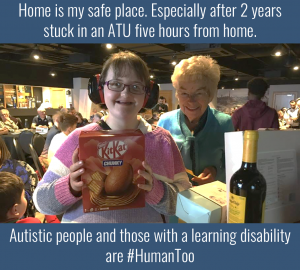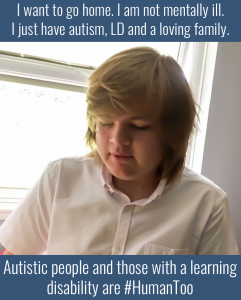 We are all #HumanToo …. aren’t we?
We are all #HumanToo …. aren’t we?
As institutional abuse continues and after the failure of Transforming Care, Isabelle Garnett started a movement – #HumanToo – to give a voice to those who are hidden away
Eight years ago, the human rights abuses at Winterbourne View were exposed by BBC Panorama.
The resulting five-year Transforming Care programme, intended to make homes not hospitals possible for those with learning disabilities and autistic people, ended in April 2019, having failed to reach its targets. There has been no significant change in the numbers of people in assessment and treatment units (ATUs). The ‘right support’ has yet to be built in the community. Health, social care and education still work in silos and people continue to reach crisis point because of unmet need.
Care has not been transformed. There is no clarity from those with the power to effect change about how or indeed whether care will be transformed at all. There are too many distressed families, including mine, whose loved ones have endured the trauma of being ripped away from all they were familiar with and those who knew and loved them best. Too many are having to call out the horror of the ‘care and treatment’ their loved ones are subjected to in ATUs. Too many deaths by indifference. Too many harrowing but all too true headlines, such as ‘Think torture only happens overseas? Look at the cruel treatment of disabled people in Britain’ in the Independent (2019).
Those with experience, those who work at the coal face and those who could and should end this know why it is happening. There have been too many case reviews, too many reports and too many unimplemented recommendations. The ‘perverse incentives’ identified by former health minister Norman Lamb remain. Those who could address these seem unmoved by Dame Christine’s Lenahan’s exhortation that ‘these are our children’ (2017).
The outrageous truth is that, while overall inpatient figures are largely unchanged, the number of those aged under 18 years with autism, learning disability or both in ATUs has doubled. It appears this is because they are seen by those in charge – and by extension wider society – as less than human. Because of their perceived differences, they are seen as less equal so less deserving of the rights enjoyed by other humans, adequate treatment, compassionate care and – in too many cases – the love and support of their families. ATUs are the last stop on the education, health and social care line.
The Independent headline points to the public’s tendency to distance themselves from man’s inhumanity to man. In reality, the good British public are distancing themselves historically, albeit unwittingly, as they back look at progress such as the abolition of slavery or the advent of voting rights for women as signs of a civilised society. We can – and must – think again about that too.
Recently, I was speaking with a couple of fellow parents about what was happening to our children in ATUs as we travelled on the London underground to yet another meeting to ask for help from those who should be effecting positive change. A woman sitting opposite us was almost incredulous. ‘Really? This is happening in 2019? In Britain?’ She was outraged and offered to write to her MP. This made me believe that most people who have no reason to know about what happens behind locked ATU doors actually do care and want to do something about it.
#HumanToo is a movement that aims to bring one of the biggest domestic human rights scandals of our time to the general public’s consciousness, giving a voice and visibility to all those who are hidden away. It is about uniting self-advocates, families, campaigners, professionals, providers and charities behind a simple demand: ‘People with a learning disability and autistic people should have what every human deserves: an ordinary life and a home not a hospital.’
#HumanToo wants to unite all the work so many of us are doing to achieve this and strengthen our voices so they are heard by the public and, by extension, those who could and should effect change.
You can help by: using the #HumanToo hashtag when tweeting about anything to do with learning disability, autism or both; and adopting the #HumanToo logo (below) as your profile picture.
- Images are from www.humantoo.net
- email: info.HumanToo@gmail.com
- Twitter @HumanToo2
- Facebook #HumanToo and HumanToo
Isabelle Garnett is a campaigner, mother of a son with autism and member of the Community Living editorial board
References
Moore J. Think torture only happens overseas? Just look at the degrading treatment of disabled people in Britain. Independent, 9 May 2019.
Lenahan C. These are our Children. Department of Health/ Council for Disabled Children, 2017

